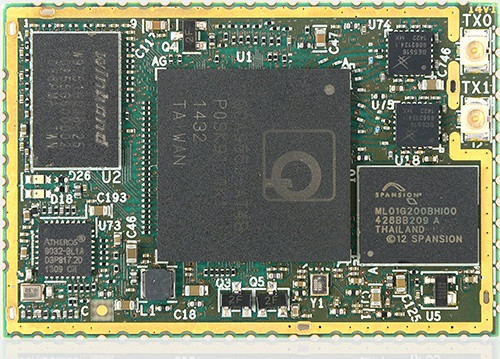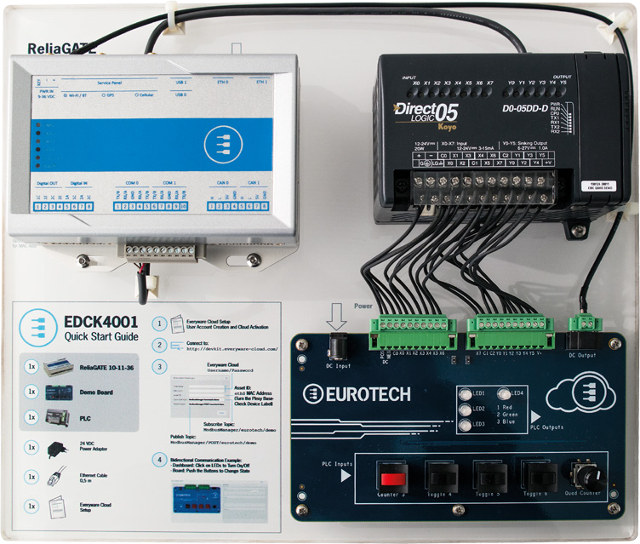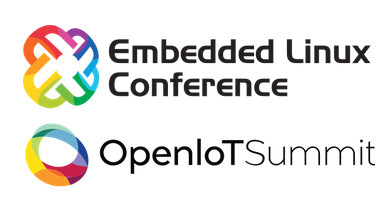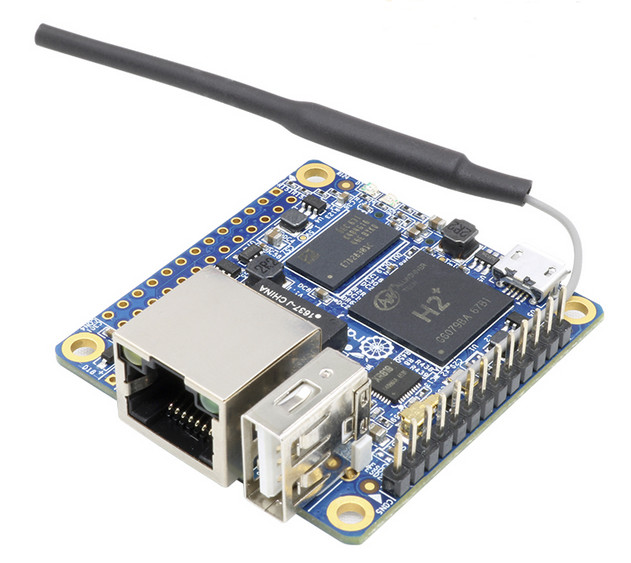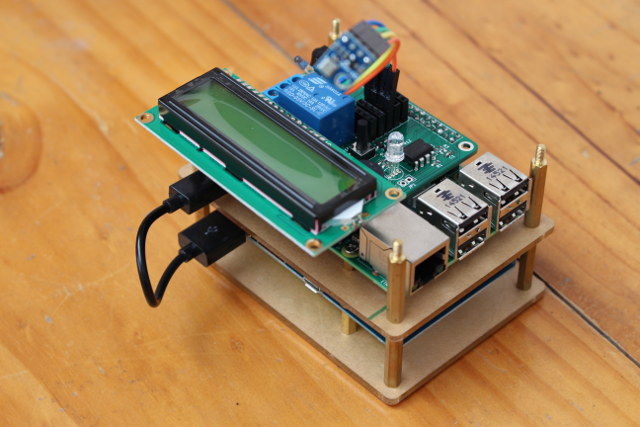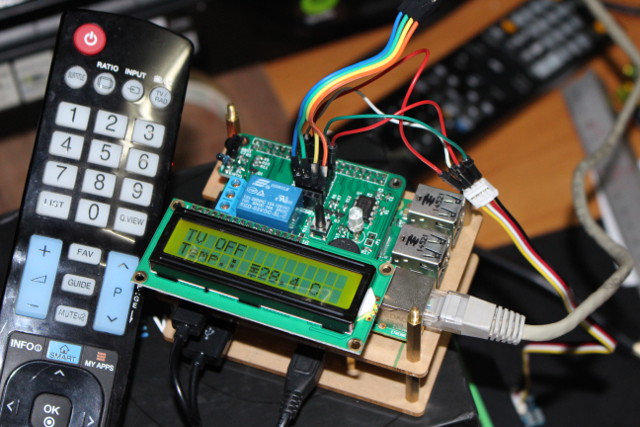LoRa appears to be one of the most popular LPWAN standards so far, with hobbyist development boards such as LoPy or LoRaONE, and we’ll soon have at least one more choice thanks to Marvin, a LoRa development board with a full size USB port. Marvin board specifications: MCU – Atmel/Microchip ATmega32u AVR MCU (same as Arduino Leonardo board) Connectivity – LoRa via Microchip RN2483; Supports both 868 MHz and 433 MHz frequency bands, on-board antenna USB – 1x USB, 1x micro USB port for power and programming Debugging – USB, and ISP header Expansion – 5x Grove connectors Power Supply – 5V via USB port Dimensions – N/A, but similar to USB flash drive The board can be programmed with the Arduino IDE, and they mention IBM Bluemix platform, and Node-RED, but overall details about documentation and software are scarce right now. One of the advantage of this form factor is […]
8Devices Rambutan Qualcomm Atheros QCA9557 / QCA9550 GbE & WiFi Modules and Development Kit Run OpenWrt
8Devices, a Lithuanian company specialized in the development and manufacturing of electronic equipment, is known for their Carambola and Carambola2 WiFi modules powered by Ralink and Qualcomm Atheros WiSoCs. The company has now introduced a new dual band WiFi module called Rambutan that comes in commercial and industrial temperature range through respectively Qualcomm Atheros QCA9557 & QCA9550 SoCs. Rambutan and Rambutan-I modules specifications: SoC Rambutan – Qualcomm Atheros QCA9557 MIPS processor @ 720 MHz Rambutan-I – Qualcomm Atheros QCA9550 MIPS processor @ 720 MHz System Memory – 128 MB DDR2 Storage – 128 MB Flash Connectivity WiFi – 802.11 a/b/g/n, 2.4 or 5 GHz, 2×2 MIMO, 300 Mbps data rate, 21 dB per chain output power; 2x u.FL connectors Ethernet – Atheros AR8032 10/100M Ethernet PHY 68x half holes with 2 x USB 2.0 host port 2 x serial port 1x 100 Base-T Ethernet port; 1000 Base-T Ethernet port (SGMII […]
Eurotech EDCK 4001 Everyware Device Cloud Development Kit Includes IoT Gateway, PLC and Demo Board
Eurotech has recently EDCK 4001 “Everyware Device Cloud Development Kit” for professionals who wish to experiment with and/or develop IoT/M2M applications. It includes the company’s ReliaGATE 10-11 IoT gateway powered by Texas Instruments Sitara AM3352 Cortex A8 processor, DirectLOGIC DL05 PLC, and a control/demo board with buttons, LEDs, and rotary encoder, as well as all necessary cables and accessories. ReliaGATE 10-11 gateway specifications: SoC – Texas Instruments AM3352 ARM Cortex A8 processor @ 800MHz Memory – 512MB DDR3 Storage – 4GB eMMC flash, user accessible micro SD Slot Connectivity – 2x 10/100Mbps, WiFi and Bluetooth, optional Cellular connectivity and GPS via ReliaCELL USB – 3x USB 2.0 host ports; noise and surge protected Serial – 2x RS-232/RS-485 (Surge protected, RS-485 termination and Fail-safe Resistors); 1x Serial Console TTL CAN – 2x CAN 2.0b bus with 5V/100mA power out Digital I/O – 2x Digital Input 5V (TTL), 1KV opto-isolated – 2x […]
Embedded Linux Conference and OpenIoT Summit Europe 2016 Videos are Now Available Online
The Embedded Linux Conference and OpenIoT Summit Europe 2016 conferences took place on October 11 – 13 in Berlin, Germany, with many interesting talks about Linux, development boards, power management, embedded systems, software optimization, tools, and so on, as well as a few keynotes. The Linux Foundation has recorded most talks and keynotes, and made the videos available on their website. A free registration is required, and will redirect you to the full unlisted playlist on YouTube. Tim Bird keynote can be watch directly without registration. You can also download the slides for each presentation. Thanks to Harley for the tip. Jean-Luc Aufranc (CNXSoft)Jean-Luc started CNX Software in 2010 as a part-time endeavor, before quitting his job as a software engineering manager, and starting to write daily news, and reviews full time later in 2011. www.cnx-software.com
Sonoff POW and Sonoff TH16 WiFi Relays Review – Part 1: The Hardware
Sonoff TH16 is a WiFi 16A relay that can take external sensors via a 2.5mm jack, while Sonoff Pow is a WiFi relay capable of measuring power consumption. Both have been designed by ITEAD Studio, and feature Espressif ESP8266 WiSoC. The company sent me both items for review, and I’ll start by checking out the hardware a little more closely than what is possible during the product announcement. I received Sonoff TH16 together with Sonoff AM2301 temperature and humidity sensor, which I’ll use to use to control an outdoor water pump and gather temperature and humidity data, as well as two Sonoff POW relays,which I plan to use to measure power consumption in my office, both from the power outlets and my aircon. All three WiFi relays support 3500 Watts, and 85 to 250V input. The packages have three QR codes for eWeLink iOS app, the Android app (coolkit.apk), and […]
Orange Pi Zero Allwinner H2+ Board with WiFi and Ethernet is Up for Sale for $7 and Up
Orange Pi Zero development board powered by Allwinner H2+ quad core Cortex A7 processor with 256 to 512MB RAM, Ethernet, and USB ports is now available for sale on Aliexpress for just $6.99, with shipping adding $3.39 in my case bringing the total to $10.38. Orange Pi Zero specifications: SoC – Allwinner H2(+) quad core Cortex A7 processor @ 1.2 GHz with Mali-400MP2 GPU @ 600 MHz System Memory – 256 to 512 MB DDR3-1866 SDRAM Storage – micro SD card slot Connectivity – 10/100M Ethernet + 802.11 b/g/n WiFi (Allwinner XR819 WiFi module) with u.FL antenna connector and external antenna USB – 1x USB 2.0 host ports, 1x micro USB OTG port Expansion headers – Unpopulated 26-pin “Raspberry Pi B+” header + 13-pin header with headphone, 2x USB 2.0, TV out, microphone and IR receiver signals Debugging – Unpopulated 3-pin header for serial console Misc – 2x LEDs Power […]
RabbitMax Flex IoT Board for Raspberry Pi Supporting up to Five I2C Sensors Launched on Indiegogo for 20 Euros and Up
RabbitMax Flex is an add-on board, compatible with HAT specifications, for Raspberry Pi 2 /3 boards and other Raspberry Pi models with a 40-pin GPIO header. It includes headers for up to 5 I2C sensors, as well as an RGB LED, a buzzer, a relay, a button, infrared receiver and transmitter, and an optional LCD display, and as we’ve seen in my RabbitMax Flex getting started guide, a nice way to learning about hardware programming using either C or Python, or to used in home automation or IoT projects. The project has just been launched on Indiegogo. RabbitMax Flex specifications: Relay – Songle SRD-05VDC-SL-C supporting 125V/250VAC up to 10A, 30VDC up to 10A Storage – EEPROM with some system information for identification IR – IR LED, IR receiver Misc – Buzzer, Button, RGB LED Expansion Header for LCD character display + potentiometer for backlight adjustment 5x 4-pin headers for I2C […]
Getting Started with RabbitMax Flex IoT and Automation Hat for Raspberry Pi
At the beginning of the month I showed how to assemble RabbitMax Flex, a Raspberry Pi HAT compliant add-on board for Raspberry Pi boards with 40-pin header, that targets IoT and home automation project with its relay, IR transmitter and receiver, I2C headers for sensors, buzzer, RGB LED, and more. Since I’ve already described the hardware, I’ve spend some time this week-end following the user’s guide to play around with the board using a Raspberry Pi 2 board, and try various features. The user’s manual explains that you need the latest version of Raspbian, but I’d not played with my Raspberry Pi 2 board for a while, so the kernel and firmware were quite old:
|
1 2 3 4 5 6 |
uname -a Linux raspberrypi 4.1.7-v7+ #817 SMP PREEMPT Sat Sep 19 15:32:00 BST 2015 armv7l GNU/Linux pi@raspberrypi ~ $ /opt/vc/bin/vcgencmd version Sep 23 2015 12:12:01 Copyright (c) 2012 Broadcom version c156d00b148c30a3ba28ec376c9c01e95a77d6d5 (clean) (release) |
So the first thing I had to do was to upgrade Raspbian. There are basically two options to upgrade, either downloading and dumping the latest Raspbian firmware image to your micro SD card, and […]



